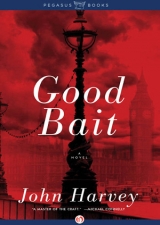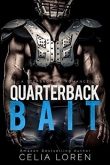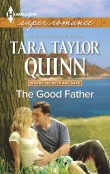
Текст книги "Good Bait"
Автор книги: John Harvey
Жанр:
Триллеры
сообщить о нарушении
Текущая страница: 9 (всего у книги 19 страниц)
25
The cemetery was just south of the road that separated Heamor from Penzance proper, an expanse of land protected by trees and closely studded with markers in marble and stone. Late afternoon, the winds that had earlier scoured the day had all but died and the light was fading in the sky. Cordon’s own father was here, had been here for some little time; his grave, as he would have wanted, plain and largely unadorned. Three lines from Robert Louis Stevenson, cleanly carved …
Under the wide and starry sky,
Dig the grave and let me lie.
Glad did I live and gladly die.
Cordon had found them in a book of verse that had lain beside his father’s hospice bed, uneasily underlined.
Three plots away lay the grave of an unknown French merchant seaman, a victim of the First World War, who for some reason had washed up on this part of the coast. There were other sailors buried there, too, Cordon knew; they had learned about it at school. Seventeen of the crew of the trawler Wallasea, killed in an attack by German surface craft down in Mounts Bay in January 1944. In his primary class they had made drawings, heavy the lurching blue of the heaving sea, the sky above erupting with the scarlet crash of exploding shells. The teacher had taken them to the causeway that leads, at low tide, across the edge of the bay towards St Michael’s Mount and had them stand there, silent, staring out, thinking the unthinkable. His fingers had been cold, Cordon remembered, the first inklings of returning water pooling around the thin soles of his plimsolls.
Only the smaller of the two chapels was in use today, Maxine’s friends a staunch but motley crew: some who’d known her from the streets, the squats and sleeping rough, those who’d survived; others she’d known from the Churches Breakfast Project or Addaction Community Support; a few neighbours from the street where latterly she’d lived, one of whom had invited mourners back to her house after the ceremony for sandwiches and tea.
Of Maxine’s immediate family, there was no sign.
No Clifford Carlin.
No fostered children.
No Letitia: no Rose.
Seated on hard wood, knees pressed against the pew in front, Cordon struggled to concentrate on the clergyman’s words, the benign platitudes, the elisions that skated over a misplaced life. An irregular death.
Behind him, an elderly man’s suit exuded an almost overpowering smell of mothballs. Heads bowed, tears here and there were sniffed or coughed away.
When the organist wheezed out the introduction to the 23rd Psalm, ‘The Lord is My Shepherd’, Cordon turned smartly and pushed his way outside.
She was standing immediately opposite the double doors, pale raincoat unbuttoned over a black dress, her mouth a dark red gash across her bloodless face.
Startled, Cordon stopped in his tracks.
‘Not a ghost,’ Letitia said. ‘See.’ She plucked at the skin tight on her cheek. ‘It’s real.’
The lines, the gauntness made her somehow more attractive, Cordon thought, not less. Then banished the thought as quickly as it came.
‘Been a while,’ she said.
‘Yes.’
‘How long?’
‘I don’t know. Years.’
‘Too long, that’s what you’re meant to say.’ Mocking him with her eyes. ‘You don’t look any different – that too.’
‘It’s true.’
‘Is it, bollocks.’
‘We all get a bit older.’
‘Not you. You were always fucking old.’ She reached into her bag for a cigarette.
‘Now you’re running some hotel in the Lake District.’
‘Anything wrong with that?’
‘Bit slow for the likes of you, I’d’ve thought.’
‘Gets too quiet we go down the Pencil Museum for a bit of a laugh.’
‘We?’
‘Me an’ anyone else who’s around.’ She glanced towards the doors. ‘Let’s shift before we get knocked down by the crowd.’
They stood by a section of stone wall, yew trees to either side. Car headlights hollowed yellow and amber along the road at their backs. Fifty metres away, the upturned earth of a freshly dug grave.
‘She came to see you,’ Cordon said, ‘in London. Maxine.’
‘Silly cow.’
‘She was worried.’
‘Because I didn’t want to spend time listening to my dad’s old records while he tells me what I could’ve done with my life?’ She flicked ash towards the ground. ‘I changed my mind, didn’t I? No fuckin’ crime.’
‘But you did see her? In London?’
‘Jesus, what’s with all the questions?’
‘Did you see her?’
‘No, I never saw her. Didn’t know she was there, did I?’
‘She had an address, Finsbury Park.’
‘So?’
‘She would have gone looking for you there.’
‘And not found me.’ Letitia turned towards the doors. ‘They’re coming out now, we better move. See her – what is it? – committed to the earth.’
Cordon fell in step beside her, rested his hand on the crook of her arm. ‘Maxine. The train. You really think she fell?’
She knocked him angrily away. ‘She’s dead, right? Inside that soddin’ box. A closed bloody coffin ’cause of what the train …’
She ran an arm across her face, her eyes.
‘You want to play the fucking policeman, don’t do it with me. We understood?’
Fragments of earth showered against the coffin lid, small stones bounced once and slid off to the sides. The trowel passed from hand to hand. Ignoring it, Letitia reached down and scooped up raw dirt from the ground, then, leaning out over the graveside, let it fall between her fingers till there was nothing but air.
There should have been rooks cawing at the sky, Cordon thought, but instead there was silence, a moment of almost true silence, and then the awkward shuffling of feet, a few mourners already, hands in pockets, moving away. He had been thinking of his father, the meticulous way he would plan each step, each journey, each and every trip they made to this or that bird sanctuary or wildlife refuge; the small notebooks in which he would record everything they had seen. A meticulousness that had driven the young Cordon close to distraction.
If a thing’s worth doing …
He did hear a bird then, rook, crow or jackdaw – his father would have known in an instant – but when he raised his eyes to look the bird was not there but in the past.
Shoulders brushed by him as he stood unmoving, remembering the last time he had bent to kiss his father’s cheek, the roughness of the older man’s unshaven face, the smell of something slowly rotting on his breath. Leaving, he had stepped out into a failing light much like this.
Gradually, he realised someone was standing beside him.
‘Are you all right, love?’ A woman, round faced, bundled in black. He didn’t know who she was.
‘Yes, thanks. I’m fine.’
‘Sometimes it takes a while.’ She squeezed his hand. ‘You’ll come back to the house? No sense letting all that good food go to waste.’
When he looked for her, Letitia had already gone. Taken one of the taxis, doubtless, that hung, like carrion, around the cemetery gates. From there to the station. The early evening train. Plymouth, then Bristol. Where then? East to London, north to the Lakes?
Back home, Cordon slapped some music on the stereo, splashed whisky into a glass. You want to play the fucking policeman, don’t do it with me. We understood?And, underneath that, his father’s patient tones: If a thing’s worth doing …
He jacked up the volume, stared out across rooftops to the bay.
Eric Dolphy in Champaign, Illinois, March 1953. ‘Something Sweet, Something Tender’.
Who did he think he was trying to kid?
26
One of these mornings, Karen thought, she’d step outside and not feel the bite of frost on her face and know winter was finally over. But not yet. She tightened the scarf at her neck and fastened the last button on her coat. Her breath curled like pale smoke on the air.
Carla had returned to her own flat and would be back at the National that evening, treading the boards. ‘The show,’ as she’d said, ‘had best go bloody on. And I do mean bloody. More bodies per minute with these Jacobeans than Camden can come up with in a year.’
Karen had expressed her concern.
‘Best thing for me,’ Carla had assured her. ‘After this week there’s a break and then we’re off on tour. Milton Keynes, Woking and points west. Bringing Middleton to the masses.’
But when Karen had clasped her arms round her in a farewell hug, she had felt Carla’s body shake and read the residue of fear in her eyes. She wished there was more she could do for her, more to help, but didn’t know what it was. Maybe, in time, the impact of what had happened would lessen, though she would never fully forget. Maybe, Karen thought, Carla would find a way to use it in her work.
She was crossing the street when her mobile rang. Tim Costello. Reports of a drug-related shooting in Camberwell had come in, a seventeen-year-old youth with known drug connections found in the early hours of the morning with gunshot wounds to his legs and back.
‘Some link with Walthamstow, that’s what you’re thinking?’
‘It’s possible.’
‘On your bike, then, sunshine.’ Karen felt herself grinning. She’d been wanting to say that for ages. ‘Get yourself down there. And don’t let anyone bully you around.’
She snapped the connection closed.
Mike Ramsden was waiting in her office, cigarette smoke acrid on his breath, skin loose and baggy around his eyes. Karen found herself wondering, not for the first time, where he’d slept, his bed or someone else’s, a couch, the floor.
‘You okay?’
‘Been better.’
‘Want to talk about it?’
‘What? You’re my mother now?’
‘Suit yourself.’ She slid into the chair behind her desk. ‘Terry Martin, how’d it go?’
‘Difficult to find a more innocent man. Shocked at what had happened over at Camden, what he’d seen on the news. Specially when he saw one of the blokes killed was someone he knew. Used to, anyway. Aaron Johnson. Hadn’t seen him in a twelvemonth, maybe more. Not as much as clapped eyes on him. Bit of a falling-out. No idea what he was into these days. Something a bit iffy, he’d not be too surprised, but he’d no idea what.’
‘And Parsons? He knew Jamie Parsons?’
‘Just a name, he reckons. Heard it a few times, bandied around. Wouldn’t know him if he bumped into him on the street. Not that he’ll be doing that any time soon.’
‘You believed him?’
‘Like I believe water flows uphill, yes, I believed him. Not the same as having proof.’
‘And we still haven’t been able to shake his alibi for the Andronic murder?’
‘Not so far.’
Karen sighed; shuffled some papers across her desk. ‘The car. Camden. Better news there?’
‘Some. Stolen from outside a house in Totteridge twenty-four hours earlier. Right off the drive.’
‘Reported?’
Ramsden nodded. ‘Some bigwig with a firm of financial consultants in the City. Bonafides checked down to the colour of his socks.’
‘Not turned up since?’
‘No, but it will. Dumped somewhere. Likely torched.’ Ramsden shook his head. ‘Bloody waste. Nice motor like that. Next to brand new.’
‘And Tottenham? Hector Prince?’
‘Still waiting on Trident.’
Karen held a breath; released it slowly. ‘Okay, press on. We’ll talk again later.’
‘I don’t doubt.’
Karen switched on her computer. Time for a quick rattle through her emails before checking her in-tray, getting some shape into the day.
Tim Costello was back by mid-afternoon. First signs were the weapon used was a 9mm pistol, most likely a Glock. Pretty much the weapon of choice. Forensics would be checking the ammo against that used in Walthamstow and the chance it might have come from the same batch that had originated in Deptford, the pistol also.
‘Okay, Tim,’ Karen said. ‘Let me know how things develop.’
She’d seen the victim’s naked body in the morgue, the Walthamstow murder, skinny arms popped with needle marks, lesions on his skin. His face, parchment white, the face of a boy, a young man never growing old. Another victim, she thought, of the same lack of opportunity and education as Hector Prince. A different colour, but the same skewed culture.
For a moment, she closed her eyes, as if in prayer.
But praying, as she knew, no longer got it done.
Perhaps it never had.
The phone rang and she answered it. Listened, making brief notes as she did so. Dialled another number, internal, passed the information on, setting another line of inquiry in motion. It was what you did. Kept going through the procedures, fingers crossed, hoping sooner or later something would fall into your lap.
Much on your plate right now? All under control?
Karen shook her head. You did what was possible. Conscientiously. Avoiding error. And at the end of the day you went home. Never leaving it all quite behind.
As if you could.
27
Cape Cornwall was where Cordon sometimes went when he wanted to be alone and think; also to remember. And marvel. The extremity of the ocean that tipped out at that point against the rock. He zipped up his heavy jacket and started to climb; stood, finally, at the summit, facing out, oblivious to the wind, the cold.
He had come here first with his father, racing him to the top and then, breathless, pointing out beyond the lighthouse to the waves, the possibility of seals, pods of dolphins, basking sharks. His father focusing the binoculars, patient, waiting. The young Cordon anxious, eager to be up and moving, scrambling down the monument then round, faster and faster each time.
‘For God’s sake, sit still for a moment. Go on, it won’t hurt you, sit.’
And then from his father’s rucksack, the brown bread sandwiches, carefully cut; the Thermos flask. The book of birds; of grasses; of wild flowers: neatly annotated, ticked.
Cordon watched now as a little egret – see, he remembered – tugged something from between the pebbles back of the water’s edge and flew away. Were there moments, he wondered, when his son, off in Australia, looked up suddenly from whatever he was doing, startled by a memory of something they had done together, father and son, something they had shared?
He shook his head.
Argued, they’d done that. Little else.
Families, it was what they did. Fought, argued, walked out, walked away, tried to keep in touch and failed. Maxine Carlin had gone up to London to see her daughter, prompted by some unnecessary fear, and, not finding her, on her way home, unused to the busy thrust of the London Underground in the rush hour, had fallen under a train and been killed.
Clear as that.
The inquest, the inquiry had found nothing suspicious: accidental death. Her daughter had thrown black earth on to her coffin and walked away. You want to play the fucking policeman, don’t do it with me. We understood?We were understood.
People wanted help or they didn’t.
Friendship the same.
Love, even.
He kicked the toe of his shoe against the hardness of the rock, and, rising, set his back to the sea and took the slower, more winding path back down towards the old chapel that had long been converted to a cattle byre and now sat in partial disrepair. Away to the left, descending, he could see the tall chimney of the Kenidjack arsenic works, which in Victorian times had provided a compound that, when mixed with chalk and vinegar, women, anxious to lighten their complexion, had not only rubbed into their arms and faces but eaten.
He’d learned that from his father, of course, that and the fact that before antibiotics, another compound of arsenic had been used for curing syphilis. When it wasn’t being used as poison.
A bit of good and bad in everything.
What his father had believed.
He had just made it to where his car was parked when his mobile rang. Not a number he recognised.
‘Look, I’m not sure if I should be phoning you …’ Clifford Carlin’s voice was troubled, shaky. ‘I didn’t know what else to do.’
‘What’s happened?’
‘Letitia – she came here after the funeral …’
‘Tell me what’s happened.’
‘Nothing. Nothing, just … ever since she got here … she’s been, I don’t know, worried. Frightened, even.’
‘What of?’
‘That’s it, she won’t say. Not clearly, not exactly. But there have been these calls to the house. And people, she says, driving past, hanging round.’
‘You’ve seen them? These people?’
‘No, no, not really. But she’s not making it up, I’m certain. She’s scared. And if you know Letitia, you know she doesn’t scare easily.’
‘What about the police? If she’s in some kind of danger.’
‘She won’t. She said no. No police.’
‘You phoned me.’
‘Like I said, I didn’t know what else to do.’
A Land Rover backed into the space alongside him and Cordon moved away, down towards the stone wall that marked the car park off from the land that tumbled down towards the sea.
‘Are you still there?’ Carlin asked.
‘Yes, I’m here.’
‘The thing is, Letitia, I don’t even think it’s herself she’s most frightened for. It’s the boy.’
The line went dead, leaving Cordon staring out across limitless water.
What boy? he asked himself. What boy?
28
He was three years old. Rising four. He stood close to his mother, face fast against her hip, one hand clinging to the strands that were unravelling from the borrowed jumper she was wearing. Her father’s jumper. The boy’s grandfather. A lick of dark hair hung loose across his forehead; his brown eyes wide with uncertainty and fear.
‘What the fuck are you doing here?’ Letitia’s greeting.
The child flinched at the anger in his mother’s voice and clung tighter, closer to tears.
Cordon said nothing.
Off to one side, Clifford Carlin shuffled his feet.
‘It’s you, isn’t it?’ she said. ‘You stupid interfering bastard.’ Pushing the boy away, she lunged at her father and raked her nails across his cheek.
‘Christ, Letitia!’
‘Stupid, stupid, stupid!’ As he turned from her, she pummelled his back with her fists.
‘Mum! No, Mum, no. Don’t. Don’t.’
The boy tried to pull her away and she flung out a hand and caught him in the face and for an instant he stopped dead, as if in shock, then screamed.
‘Oh, Jesus! Now see – see what you’ve done? The pair of you?’
There was blood at the corner of her son’s mouth, starting to trickle down his chin and on to his neck.
‘See what you’ve made me fucking do?’
‘Letitia, listen …’
‘Here, sweetheart, here. It’s all right.’ Pulling a tissue from her pocket, she dabbed it at the boy’s face. ‘It’s nothing, really. Just a little cut. There, look. It’s already stopped.’ Crouching, she hugged him to her. ‘I’m sorry. Mummy’s sorry.’
The two men looked at one another and Clifford Carlin shook his head. A few moments later, without saying anything more, he left the room.
The boy was sobbing now, but quietly, face pressed against his mother’s chest.
‘Letitia …’
‘I told him …’ She spoke to Cordon without yet turning to look at him. ‘I told him, this stuff that’s happening, don’t say anything, not to anyone. It’ll sort itself out. Leave it be. Say anything to anyone, anyone at all, it’ll only make things worse.’
‘He was worried.’
‘Of course he was fucking worried. I’m worried. Worried sick. A sight more now you’re here.’
‘Maybe I can help.’
‘Yeah?’
‘Yes, why not? Try, anyway.’
‘Try?’ She laughed. ‘Fuckin’ try?’
She stood to face him.
‘Sir Lancelot, now, is it? Knights of the Round fucking Table?’ She shook her head. ‘Okay, here we are, me and the kid, in need of rescue maybe and what do we get?’ She laughed, ragged and deep. ‘That bloke with a broken lance on some old nag. I saw a film about him once. That’s you, Cordon, about as much use as a tit in a trance.’
Cordon drew a slow breath and continued to stand where he was, the boy peeking out at him from behind his mother’s arm, only looking away when Cordon smiled.
Later.
They were sitting side by side on the stairs, the middle landing. It had seemed as good a place as anywhere. Clifford Carlin had gone in to open up his shop and left them to it.
Cordon sat with a mostly empty can of Carlsberg wedged between his feet; Letitia was drinking vodka and Coke, not the first.
She was still wearing one of her father’s old sweaters, faded jeans, feet bare, chipped polish on the toes. She’d pulled her hair away from her face and wiped most of the tiredness from around her eyes. The child was in one of the rooms above them, sleeping, thumb in his mouth, making occasional sucking sounds, a plastic stegosaurus tight in his other hand.
She’d cuddled him close earlier, the pair of them loving, silent; something inside Cordon’s gut had twisted like fish caught on a hook.
‘Your son,’ Cordon said quietly. ‘I don’t even know his name.’
‘Danya.’
‘Danya?’
‘Ukrainian. Means gift of God. Some fucking joke.’
‘And that’s what you call him?’
‘What his father calls him. I call him Danny. Dan.’
‘His father?’
‘Anton.’
‘Also from Ukraine?’
‘Oh, yes. From Odessa. Yellow and blue blood in his veins.’ She brought the glass to her mouth, a swallow rather than a sip. ‘Anton Oleksander Kosach. Oldest of five brothers. Anton, Taras, Bogdah, Parlo, Symon. Parlo and Symon are twins. Bogdah, the third eldest, he’s still in the Ukraine.’
‘The rest are here?’
‘Most of the time, yes. Anton’s here legally. Taras, too, maybe. The others, I’m not so sure.’
‘And he wants you to come home. Anton. The pair of you. That’s what all this is about? The phone calls, whatever. That’s what he wants?’
‘Danny, that’s what he wants. Me, I doubt if he could give a flying fuck. Not any more.’
‘But he wants you to go back, right? To wherever. You and Danny?’
‘His son, he goes on and on about his son. As if I’ve stolen him away. As if I’ve no intention of ever going back.’
‘And have you?’
A pause. Letitia fiddling with her hair. ‘I don’t know.’
‘So he’s right?’
‘No, he’s not fucking right.’
‘But if you’ve left him …’
‘I told you, I just don’t know. I don’t know, okay?’
‘So what is this?’
‘This?’
‘You and Danny, here?’
‘The funeral, my mum’s funeral – Danny, I was going to take him – but then I thought, no, no, time enough for all that. So I brought him here, to my dad, just a few days, right? While I was down in Penzance.’
‘He knew this? Anton, he knew?’
‘Sort of, yeah.’
‘And that was okay?’
‘Okay? Okay with Anton is he’s got you practically under lock an’ key, knows where you are every minute of the fuckin’ day. Him or his bloody brothers. Only wanted two of ’em to come down all the way to fuckin’ Cornwall with me, didn’t he? Parlo and Symon. I told him, I don’t want no Ukrainian bloody gangsters hangin’ round my mum’s funeral.’
‘Is that what they are then? Gangsters? Some kind of Soviet Mafia?’
She shot him a look, then turned her face away.
Anton, Letitia had told him earlier, had called her mobile when she and the boy hadn’t arrived back as expected, called and texted; threatened her, threatened her father, issued ultimatums. Forty-eight hours more. Then he would send someone to bring them back. She had already seen cars passing slowly along the street outside; glimpsed a face she thought she recognised.
Not enough to be sure.
Cordon straightened, stretched his arms. The edge of the step above was sticking uncomfortably into the small of his back.
‘We have to keep sitting on the stairs?’
‘No one’s forcing you to sit anywhere.’
‘For God’s sake …’
‘What?’
‘Why does everything with you have to be so bloody difficult?’
‘Because it is.’
He shook his head. There was a cry from above them, muffled, Danny caught in a dream.
While she was settling him, Cordon went downstairs. Tipping what remained of his lager down the sink, he set the kettle to boil and started opening cupboards. There was a jar of instant coffee, untroubled for some time, the granules set in a stiff rind that resisted the first taps with a spoon.
‘Decent stuff he keeps in the fridge,’ Letitia said from the doorway. ‘And there’s one of those filter things somewhere. Try the sink.’
Cordon switched on the radio as he waited for the coffee to drip slowly through. The middle of a news broadcast. The economy. Ethnic clashes in Uzbekistan. Afghanistan. Still Afghanistan. When had it all started, the first Anglo-Afghan war? Eighteen thirty-fucking-nine! Wars without fucking end. It made him angry in a way he didn’t quite understand. It all seemed so far away, another world. But then, even his own life in Cornwall seemed distant now, something seen through bottled glass, a blur. And this – threats of violence, Ukrainian gangsters, recrimination perhaps the world, the real world, was coming to him?
He found Letitia at the back of the house, smoking a cigarette. The sky above was muddy grey. Beyond the garden end the land rose up towards the cliff top and, on the far side, the sea. Dragging over two plastic chairs, he set the mugs of coffee down on uneven ground.
Letitia was staring off into the middle distance, shapeless in those shapeless clothes, scarcely any make-up on her face, no longer young. Despite everything, Cordon thought, she had some desperate kind of beauty. Beyond looking. Some steeliness; resilience, despite everything.
He wondered if this Anton saw the same.
The mother of his child.
His son.
I doubt if he could give a flying fuck.
Cordon wondered if that were really true.
Letitia dropped the butt of her cigarette on to the drying earth and pressed down on it with the sole of her shoe. Taking the chair next to Cordon, she picked up her mug of coffee and gave it a sniff.
‘Sugar?’
‘Two. Two and a bit extra.’
She smiled. ‘What’s that, then? Long memory or just plain luck?’
‘Copper’s instincts. Training. Every little detail.’ He tapped the side of his head. ‘Never know when it’s all going to come in handy.’
‘Gonna help us here, are they? Your instincts?’
‘Depends.’
‘Oh, yeah?’
‘Last time you spoke to him, Anton, what did he say?’
‘You mean, aside from sweetheart and darling and how he loves me more than life itself?’
‘Aside from that.’
‘If he doesn’t see my ugly whore’s face within twenty-four hours, me and Danny, he’s going to send someone to come and get us.’
‘He won’t come himself?’
‘Too much like begging. Losing face. He’ll send someone. Possibly the twins.’ She grimaced. ‘Give those two bastards an excuse and they’ll slit your throat and laugh about it. Whole world’s a bloody video game where they’re concerned.’
‘You said you’d seen someone already. A car.’
‘Maybe. I’m not sure. Could have been nothing. Imagination. I don’t know. Then again, it could be someone local, someone Anton knows, repaying a favour. Brighton, maybe. He’s got contacts down there. I know. Could be that. Making sure I was still here, hadn’t done a runner, me and the kid. Letting him know.’
He looked at her, the set of her mouth. ‘You’re not going back, are you? You’ve made up your mind.’
‘No.’ Smoke drifted upwards as she lit another cigarette. ‘No, I don’t think so. Not to that.’
‘Whoever it is he sends, you think they’re going to take that laying down?’
‘About the only way they will.’
‘They’ll use force?’
‘What else?’
‘Then we should tell the police, local. They’ll have a patrol car drive by, maybe station someone outside.’
She shook her head. ‘How long for? And even if they did, the minute Anton thinks I’ve done some kind of deal with the police, that’s it. He’ll get to me, no matter what.’
She lit another cigarette. ‘I’ve been around him too long, know too much. He wouldn’t want to take that kind of a risk.’
Know what? Cordon wondered. Too much of what?
‘What could he do?’ he said.
‘Kill me. Have me killed. Take Danny. And you wouldn’t be able to stop him. Even if you tried.’
Cordon started to speak, but she laid a finger across his lips.
‘Listen, it was good of you to come. Daft, but …’ She shook her head. ‘You’re not a bad bloke, for a copper, specially. But this … this isn’t dealing with druggies in the bus station down by the harbour; out looking for someone lost on the moors or hauling bodies back out of the surf. This is something else, Cordon. Another world. Let it go.’








